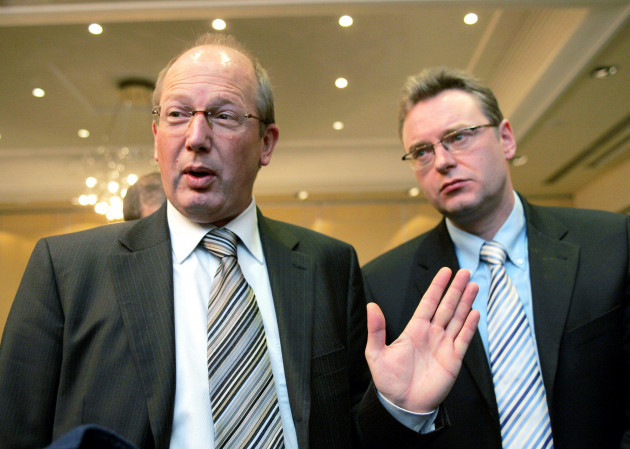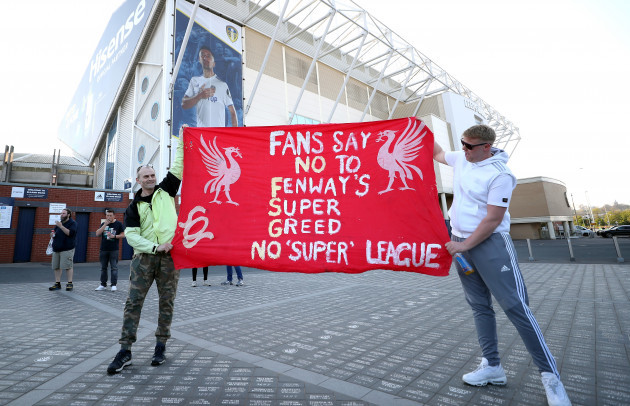IS THE FACT a Dublin club has never qualified for the group stages of the Champions League proof that the entire European football system has failed?
That’s the argument made by Swift Hesperange, a club currently topping the Luxembourg domestic league while trying to find a way to stop playing in it.
Swift Hesperange have lodged a case arguing that they should be allowed play in a cross-border, Benelux League, and asked a court in Luxembourg to refer the case to the European Court of Justice.
Swift argue Uefa’s insistence that the club plays in Luxembourg and not elsewhere is condemning them to remain a “micro-enterprise”, which thus deprives the people of Luxembourg the right to watch elite-level European football in the flesh.
Their issue is with Uefa’s territorial model, in which competitions are arranged according to 55 national territories. This, they argue, has served only the biggest countries, and left Dublin among a number of European cities deprived of elite competition.
“A quick overview of the European territory shows that the ‘Uefa territorial model’ structurally deprives some 20 (out of 27) [EU] member states of premium club football” they argue in a press release accompanying their legal arguments, and further illustrate their argument by listing Dublin among the cities “whose flagship club has no real chance of participating” in the Champions League.
(They didn’t name Dublin’s flagship club – that feels like an argument to be made below the line.)
Victory for Swift could be transformative for clubs across Europe including in Ireland, as it would open up the prospect of cross-border domestic leagues, proposals for which have arisen more than once in Ireland in recent years.
Among Swift’s team of lawyers is Jean-Louis Dupont, who is already partly responsible for transforming football. Dupont was part of the legal team that won the Bosman ruling at the European Court of Justice in 1995, which applied the EU principle of freedom of movement to football players.
In practical terms, it meant players could leave their current club for another at the end of their contract for free, and it led to the game’s wealth and power being tilted in favour of players to an unprecedented extent.
Dupont is also involved in a second case in Luxembourg, albeit one that has already been referred to European Court of Justice. The arguments have been heard too, and the court will rule on 15 December on the side of Uefa or the party represented by Dupont and his colleagues: the European Super League.
We’ll explain both arguments in more depth in a moment, but think of both cases as a kind of Bosman ruling for football clubs, rather than football players.
Let’s start with Swift Hesperange case.
The club argues that football underwent an overnight revolution with the Bosman ruling and that football’s governing bodies didn’t move with the times. Whereas the players could now move freely, the clubs couldn’t move with them, and thus couldn’t expand their market base to appeal to the top players who now had the right to hold out for the best price.
“Suddenly, the best young Belgian player was no longer forced to sign for one of the two or three main Belgian clubs: he was free to sign for Bayern or Juventus, which he certainly did”, argue Swift in the aforementioned release. “Uefa did not take decisions to adjust the production market to the new realities of the labour market. On the contrary, they have kept all the clubs in the ‘small’ states in their national straitjackets…to the detriment of all their fans (consumers.)”
Hence, they argue, why these clubs from smaller countries won’t ever make the Champions League: how can they compete with the bigger countries if they can’t play outside the limits of their national borders?
“Under the current system clubs are actually the losers, particularly from smaller countries”, says Dupont in email correspondence with The42. “Many traditional clubs are effectively impeded from developing and growing under Uefa’s current territorial model and thus also from ever taking part in the Champions League. The funding system, firmly designed along national borders and corresponding media revenues, is the key problem. Contrary to what Uefa claims, financial solidarity is weak, as the vast majority of Uefa’s payments go mainly to medium-sized professional clubs from the big leagues.
“We need a merit-based format that fosters the development of larger clubs from all important cities, regardless of the size of the home EU member state, promoting the growth of football within the EU. This is where cities such as Dublin should see a major opportunity.”
But surely cultural and historical factors unique to Ireland – such as the competition provided by the GAA, the proximity of the Premier League, and the historical dysfunction of the FAI – are more relevant to the failure of a League of Ireland club to play in the Champions League?
“Historical and cultural factors have played a role in how we got to the current situation”, replies Dupont, “but that doesn’t mean we have to just accept it forever. While the GAA has a special place in Irish society, it does not render Ireland unique among smaller EU member states. Uefa’s system is weak, and, again, some 20 member states are deprived of premium club football. Ireland is no exception.
“Ireland is not alone in having its best players taken early by a neighbouring football superpower or having them choose another sport. One can substitute GAA for basketball or handball in other European countries. The youth academies of all large clubs are full of players poached from smaller leagues.”
The reason Dupont cites “member states” so often is the fact Swift’s argument is rooted in EU law. A principle of the EU’s freedom of movement for people and for capital is that the prosperity of a member country shouldn’t be defined by the size of their territory, and so Swift Hesperange argue that Uefa are infringing the EU’s competition law by preventing clubs creating a “transnational competition that would allow all the clubs involved to develop and offer their fans, the consumers, a better quality of entertainment (product.)”
The reason fans are referred to as consumers and the football referred to as product is that the case to be made here is that football should be treated as any other business would under competition law.
To return to Swift’s argument, in their press release they hypothetically cite a Benelux League or a North Sea League which would “then have the critical mass to guarantee a regional league whose quality could match that of, for example, the French Ligue 1.”
Irish clubs were engaged on the prospect of a cross-border, all-island league in 2019, owing to a proposal developed a group led by entrepreneur Kieran Lucid. It was looked upon favourably by many, but one of its issues was the fact it would mean a reduction in the number of places in Uefa competitions on offer.
The Dutch consultancy company Hypercube were brought on board with coming up with a compromise, and their complex solution – split seasons coming together at the end for a ‘king of the island’ competition – didn’t engender mass support.
Uefa competitions are where the real money is in Irish football. The total prize fund in the League of Ireland this season is €600,000, whereas Shamrock Rovers have guaranteed themselves more than €3 million by qualifying for the group stage of the Conference League. To further illustrate that divide, Rovers will bank €500,000 for every game they win in the group.
“Today, clubs are caught in a vicious cycle”, says Dupont. “While they are dependent on the revenue generated by Uefa’s system, this system is simultaneously preventing their development and is curbing their investment opportunities. Clubs are trapped in a system that has no ambition for reform and threatens sanctions on every club that is trying to actively shape their own development.”
That last line takes us to the second case, that of the European Super League. While nine of the 12 clubs quickly slunk, ashen-faced and red-handed away from the proposals of last year, Real Madrid, Barcelona, and Juventus have remained on board. All of the Super League backers were threatened with sanctions: Uefa said they would kick them out of the Champions League, while Fifa threatened that Super League players would not be allowed to play at the World Cup.
The remaining three clubs went to court to argue that Uefa and Fifa had violated EU competition law in threatening these sanctions, and preventing the formation of their competition. A Madrid court referred the decision to the European Court of Justice in Luxembourg, and the judgement will be handed down on 15 December.
The ESL clubs are also citing EU competition law, which exists to combat the creation of cartels or monopolies that would be damaging to the consumer or, in the case of football, the fan.
The clubs have argued that Uefa breached these EU competition laws and acted as a monopoly in sanctioning the clubs for signing up to the Super League, claiming they did so as they wanted to protect their cash-cow, the Champions League. They also argue that Uefa have an inherent conflict of interest in arranging and regulating competitions from which they profit.
Uefa countered by saying they are following the EU’s constitution in acting to prevent the Super League. Their argument rests on Article 165 of the Lisbon Treaty, which enshrines a “specific nature” for sport, and requires EU member states to “promote a fairness and openness in sporting competition.”
Uefa have previously published a document outlining their stance on the Treaty Article they cited in court, stating their belief that sport is “not above the law” but cannot be treated as “another business.” The ESL Clubs and Swift Hesperange argue that, when it comes to the EU’s laws underpinning free movement and competition, football should be treated as another business.
Uefa also say that sport’s “specific” values are expressed by the European Sports Model, which they define as being “characterised by a democratic, territorial, and pyramid-shaped structure.” This pyramid, Uefa argued, is essential to the funding of grassroots football across Europe, as money trickles down to a broad base from the Champions League at the narrow peak.
In court, Dupont dismissed Uefa’s pyramid structure. “The Egyptians built magnificent pyramids but Uefa’s wouldn’t win any architectural prizes”, he said, pointing, like Swift Hesperange, to the fact clubs in small national markets can’t escape them.
Uefa argued that a closed-shop Super League with no promotion and relegation – was was the plan last year – isn’t exactly a bastion of “openness.” And while that may be a strong argument, the ESL clubs aren’t in court for the judges to give their 12-team structure a thumbs-up. The ruling won’t instantly decide on the format of a competition, but merely the rights of the clubs to set up a new competition.
The ESL clubs also argued their competition could distribute more funds to lower-level of the game, saying they could exceed Uefa’s £250 million by at least £100 million, and would be overseen by an independent body they did not specify.
Nobody knows what the result will be, and won’t until the judgement is published in mid-December. The ruling will either kill the Super League and any other clubs’ hopes of breaking away from Uefa’s continental competitions, or else breathe new life into those ambitions.
The Swift Hesperange case, meanwhile, may give clubs the opportunity to break away from their own domestic leagues.
Shamrock Rovers, meanwhile, kick off their Europa Conference League campaign against Djurgardens at Tallaght Stadium next Thursday. They, like all other clubs in Uefa’s trio of men’s club competitions, will kick off beneath an incongruous shadow cast from Luxembourg.


